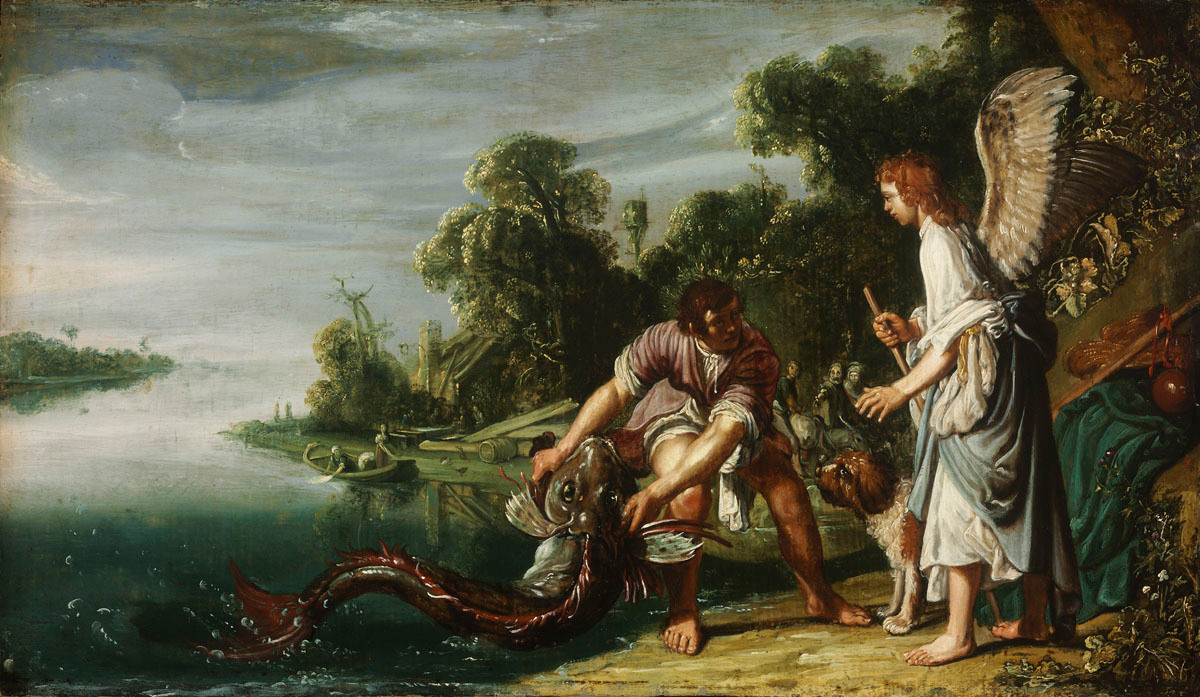+
JMJ
December 18
Yesterday
we talked about how the Assyrians took over the kingdom of
Israel.
Israel, you remember, was made up of the 10 tribes of Israel in
the
north, who broke away during the reign of King Solomon's son, Roboam.
Because the
Temple of Jerusalem was in the kingdom of Judea in the south,
however, the other tribes would not go there to worship as God
commanded. Instead they set up false gods at the places of
Bethel and
Dan. Over the years, God sent prophets to bring His people back,
but
in the end, the Assyrians took over Israel.
Not all
Israelites worshiped false gods, though.
At the same
time that the Assyrians were taking over Israel (722 B.C.),
there
lived a man named Tobias. He was of the Hebrew tribe and city of
Nephtali. Tobias did not worship the golden calves at Bethel and
Dan.
He went to worship God in the Temple of Jerusalem instead.
It says in
the book of Tobias that, “When he was made captive…even in his
captivity, forsook not the way of truth” (Tob 1:2)
When they
captured Israel, the Assyrians made Tobias and his people move
to the
city of Ninive. Tobias comforted and encouraged the others. He
gave
food and clothes to those who had none. He took the bodies of
those
who were killed and buried them during the night, at risk of his
own
life.
One day,
while Tobias was sleeping, some stuff from a bird’s nest fell
into
his eye and made him blind. The Bible says that God allowed this
to
happen so that Tobias might give an example of patience, just
like
Job.
Tobias
remained faithful to God saying, “we are the children of saints,
and look for that life which God will give to those that never
change
their faith from Him.” (Tob 2:18)
People in
the world today are troubled by the notion of suffering. They
wonder
what it is all for, but God asks us to trust Him. It doesn’t
really
matter what happens to us in this life, as long as we are
faithful to
our Father. Our test is so short here on earth, and our reward
for
trusting Him is for all eternity.
The saints,
in fact went one step further! They knew that we are here on
earth in
order to serve God through the salvation of souls by our
prayers,
sufferings and all that we do, united to the sufferings of Our
Lord
as part of the communion of saints.
As St. Paul
said, “Who now rejoice in my sufferings for you, and fill up
those
things that are wanting of the sufferings of Christ , in my
flesh,
for his body, which is the church” (Col 1:24)
Often we
think of the day as being “our day”. We make plans and ask God
to
bless them; giving His stamp of approval. When things go wrong,
we
get frustrated. We forget that our day does not belong to us,
but
rather to God. He has plans for us too. He made us for those
plans,
and gave us just the right mix of qualities to fulfill those
plans.
We can look at each day as an adventure with our heavenly
Father!
God had a
very special plan for Tobias also. Because of his sufferings,
Tobias
could not work. His family became very poor. Tobias had a son,
also
named Tobias. Tobias told his son to collect some money owed him
by a
man who lived far away.
 God sent
the angel Raphael to help young Tobias on his journey. On the
way,
they caught a fish and Raphael told young Tobias to keep the
gall of
the fish. Later on, they met a woman named Sara, whom young
Tobias
eventually married, according to God’s plan.
God sent
the angel Raphael to help young Tobias on his journey. On the
way,
they caught a fish and Raphael told young Tobias to keep the
gall of
the fish. Later on, they met a woman named Sara, whom young
Tobias
eventually married, according to God’s plan. The trip was a
success. The money was collected and they all returned home.
When they
arrived, Raphael instructed Tobias to anoint his father’s eyes
with
the fish’s gall. His father was healed and the family thanked
Raphael for all he had done. Then Raphael told them “I am the
angel
Raphael, one of the seven, who stand before the Lord…because
thou
wast acceptable to God, it was necessary that temptation should
prove
thee. When I was with you, I was there by the will of God: bless
ye
him, and sing praises to Him.” (Tob 12)
"O Leader of the house of Israel, who didst appear to Moses in the burning bush, and didst give him the law on Sinai: come and redeem us with Thine outstretched arm."

Comments
Post a Comment